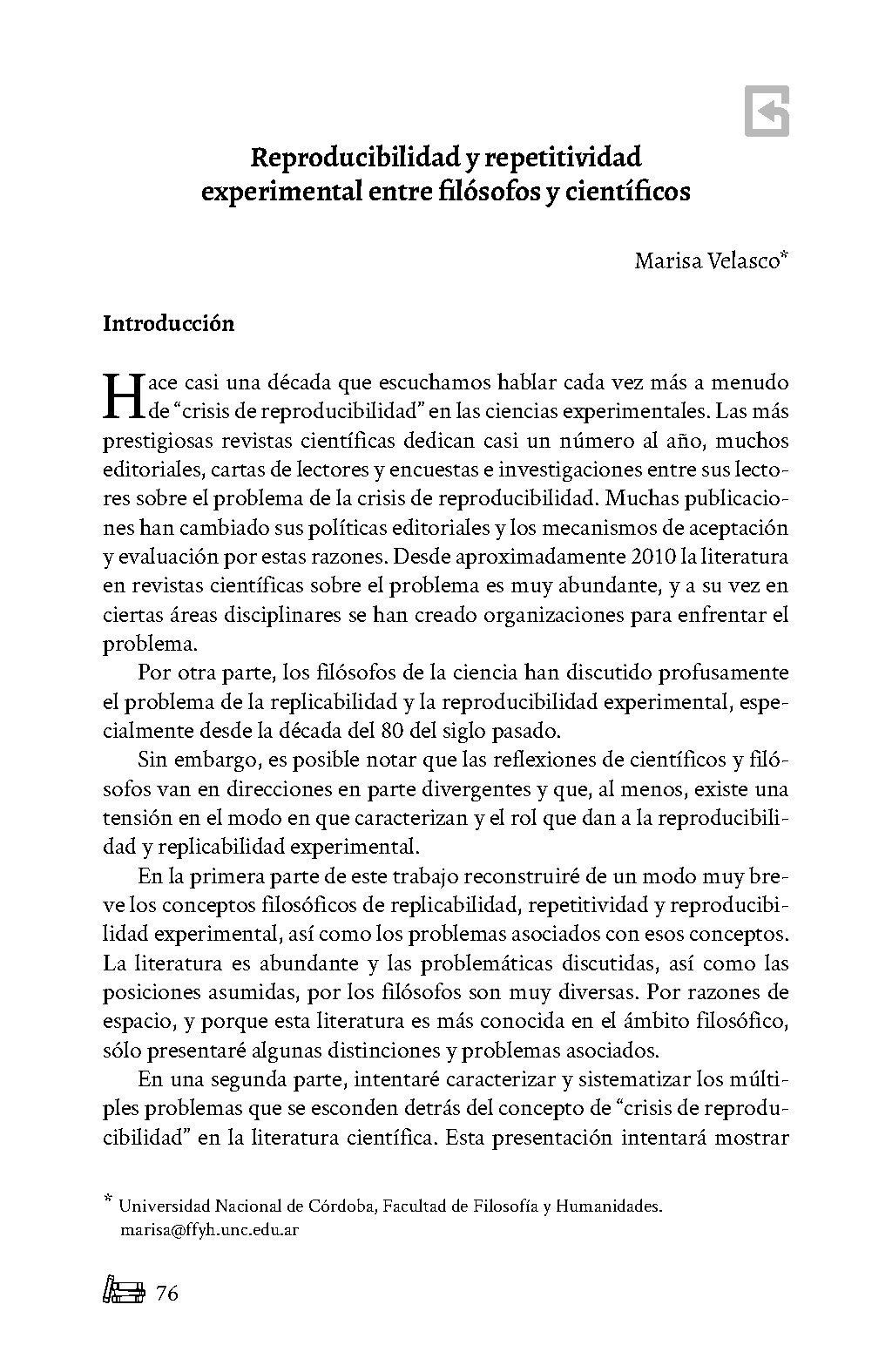Reproducibilidad y repetitividad experimental entre filósofos y científicos
Contenido principal del artículo
Resumen
En la década del 80 del siglo pasado Collins, entre otros, instaló entre los filósofos el problema de la repetitividad y la reproducibilidad experimental con diversos argumentos que se conocieron como el “regreso del experimentador”. El problema fue abordado desde distintas perspectivas en las décadas subsiguientes. A partir del año 2013, y de modo sistemático en los años siguientes, la mayoría de las revistas científicas de mayor prestigio puso nuevamente el problema en debate en la comunidad científica y se hizo común la expresión “crisis de reproducibilidad” en muchas disciplinas. Este trabajo intentará mostrar cierta tensión entre el planteo del problema por parte de científicos y el planteo del problema por parte de filósofos.
Detalles del artículo

Esta obra está bajo una licencia internacional Creative Commons Atribución-NoComercial-SinDerivadas 4.0.
- Los autores/as conservarán sus derechos de autor y garantizarán a la revista el derecho de primera publicación de su obra, el cual estará simultáneamente sujeto a la Licencia de reconocimiento de Creative Commons que permite a terceros compartir la obra, siempre que se indique su autor y su primera publicación en esta revista.
- Los autores/as podrán adoptar otros acuerdos de licencia no exclusiva de distribución de la versión de la obra publicada (p. ej.: depositarla en un archivo digital institucional o publicarla en un volumen monográfico), siempre que se indique la publicación inicial en esta revista.
- Se permite y recomienda a los autores/as difundir su obra a través de Internet (p. ej.: en archivos digitales institucionales o en su página web) antes y durante el proceso de envío.
Cómo citar
Referencias
Baker, D., Lidster, K., Sottomayor, A., & Amor, S. (2012). Reproducibility: Research-reporting standards fall short. Nature, 492(7427), 41.
Baker, M. (2015). First results from psychology’s largest reproducibility test. Nature. doi: 10.1038/nature.2015.17433
Begley, C. G. (2013). Six red flags for suspect work. Nature, 497(7450), 433-434. doi: 10.1038/497433a
Begley, C. G., & Ellis, L. M. (2012). Drug development: Raise standards for preclinical cancer research. Nature, 483(7391), 531.
Bogen, J. (2001). ‘Two as good as a hundred’: Poorly replicated evidence in some nineteenth-century neuroscientific research. Studies in History and Philosophy of Science Part C: Studies in History and Philosophy of Biological and Biomedical Sciences, 32(3), 491-533. doi: 10.1016/S1369-8486(01)00013-9
Collins, H. M. (1975). The seven sexes: A study in the sociology of a phenomenon, or the replication of experiments in physics. Sociology, 9(2), 205-224. doi: 10.1177/003803857500900202
Collins, H. M. (1985). Changing order: Replication and induction in scientific practice. London; Beverly Hills: Sage Publications.
Feest, U. (2016). The experimenters’ regress reconsidered: Replication, tacit knowledge, and the dynamics of knowledge generation. Studies in History and Philosophy of Science Part A, 58, 34-45. doi: 10.1016/j.shpsa.2016.04.003
Feest, U. (2019). Why replication is overrated. Philosophy of Science, 86(5), 895-905. doi: 10.1086/705451
Franklin, A. (1994). How to avoid the experimenters’ regress. Studies in History and Philosophy of Science Part A, 25(3), 463-491. doi: 10.1016/0039-3681(94)90062-0
Franklin, A. (1997). Recycling expertise and instrumental loyalty. Philosophy of Science, S42–S52.
Franklin, A., & Collins, H. (2016). Two kinds of case study and a new agreement. En T. Sauer & R. Scholl (Eds.), The philosophy of historical case studies (pp. 95-121). doi: 10.1007/978-3-319-30229-4_6
Grant, B. (2012). Science’s reproducibility problem. The Scientist Magazine. Recuperado de https://www.the-scientist.com/news-opinion/sciences-reproducibility-problem-40031
Leonelli, S. (2018). Rethinking reproducibility as a criterion for research quality. En L. Fiorito, S. Scheall, & C. E. Suprinyak (Eds.), Research in the history of economic thought and methodology (Vol. 36, pp. 129-146). doi: 10.1108/S0743-41542018000036B009
Norton, J. D. (2015). Replicability of experiment. THEORIA. An International Journal for Theory, History and Foundations of Science, 30(2), 229-248. doi: 10.1387/theoria.12691
Open Science Collaboration. (2015). Estimating the reproducibility of psychological science. Science, 349(6251). doi: 10.1126/science.aac4716
Popper, K. R. (1962). La lógica de la investigación científica (V. Sánchez de Zavala, Trad.). Madrid: Tecnos.
Radder, H. (1992). Experimental reproducibility and the experimenters’ regress. PSA: Proceedings of the Biennial Meeting of the Philosophy of Science Association, 63–73. Recuperado de http://www.jstor.org/stable/192744
Radder, H. (2003). The philosophy of scientific experimentation. Pittsburgh, Pa.: University of Pittsburgh Press.
Schickore, J. (2010). Trying again and again: Multiple repetitions in early modern reports of experiments on snake bites. Early Science and Medicine, 15(6), 567-617. doi: 10.1163/157338210X526629
Schickore, J. (2011). The significance of re-doing experiments: A contribution to historically informed methodology. Erkenntnis, 75(3), 325-347. doi: 10.1007/s10670-011-9332-9
Schooler, J. W. (2014). Metascience could rescue the ‘replication crisis’. Nature News, 515(7525), 9. doi: 10.1038/515009a
Steinle, F. (2002). Experiments in history and philosophy of science. Perspectives on Science, 10(4), 408-432.
Steinle, F. (2016). Stability and replication of experimental results: A historical perspective. En H. Atmanspacher & S. Maasen (Eds.), Reproducibility: Principles, problems, practices, and prospects (pp. 39-63). Hoboken, NJ, USA: John Wiley & Sons, Inc. https://doi.org/10.1002/9781118865064.ch3

